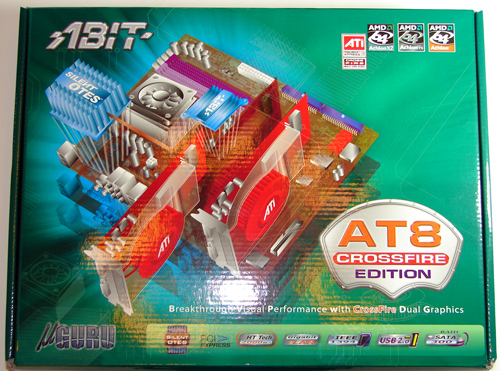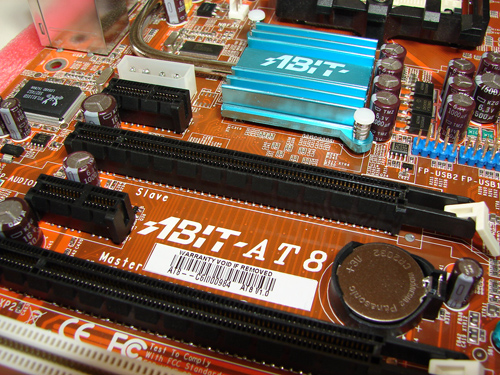Abit AT8: µGuru comes to the RD480
by Gary Key on March 10, 2006 12:05 AM EST- Posted in
- Motherboards
Abit has a long and storied history as a top manufacturer of enthusiast level boards that catered to the overclocking community. Abit found itself in trouble over the past couple of years and for all intents and purposes, it was close to ceasing business operations. Fortunately, they entered into a long-term partnership with USI this past January that should ensure their financial health for the foreseeable future. This strategic partnership also signals a return of Abit to their roots as a company driven to provide the computer enthusiast and extreme overclocker with the highest performance solutions available. Although Abit just recently announced the AT8 32X motherboard based on the ATI CrossFire Xpress 3200 Northbridge (RD580) and ULi M1575 Southbridge, we will be looking at the AT8 motherboard based on the ATI CrossFire Xpress 200 Northbridge (RD480) and ULi M1575 Southbridge solution. More information about the entire line of Abit products can be found here.
During our testing and general usage of the Abit AT8, we found the board's stability to be excellent and it delivered top results in the latest synthetic and game benchmarks once we were provided with an updated BIOS. However, our initial tests with the current 1.0 BIOS were not positive as the board suffered memory capability issues with our BH5/UTT chip based memory modules. The board refused to hold a CAS latency setting of 2 after reboot with the BH5 memory modules and would fail to post if the CAS latency setting was set to 3. The board also showed some post and incompatibility issues during testing with 1GB memory modules based upon Samsung UCCC chips.
However, the board worked fine with our Infineon based memory modules. We also noticed a disk corruption issue during RAID 0 operation with the stripe size set at 16k. We did not have this issue with the stripe size set at 64k.
We reported our issues to Abit and they promptly provided an updated BIOS, version 1.1, to use for our testing. We noticed our memory incompatibility issues were resolved for the most part and updated microcode for the ULi M1575 chipset solved our RAID setup issues. We have still witnessed a few memory issues that occur when switching memory modules without having set the DRAM setting in the BIOS to SPD. Also, the board requires a CMOS clear when extending the memory settings beyond the capability of the board or memory. The system will gracefully recover from errant CPU settings, but is still reluctant to recover from memory issues. We generally found that setting the memory settings manually or utilizing the SPD option had worked well as the Auto setting seemed to have the majority of issues when setting up the board or during overclocking.
However, the current iteration of the 1.1 BIOS introduced an issue that Abit is still trying to solve at this time. The board is an excellent overclocker when utilizing the stock multiplier. Our testing has revealed an issue with the beta 1.1 BIOS where the HTT setting does not like to be raised past the maximum HTT setting utilized with the stock multiplier. As an example we had no issue overclocking our AMD Athlon 64 4000+ to a 322 HTT setting at a 9x multiplier with the version 1.0 BIOS but could not reliably exceed a 256 HTT setting with the 1.1 BIOS which was the maximum setting at the stock 12x multiplier. We tried four different AMD processors and witnessed the same results in our testing. We tried various combinations of memory, video card, and power supplies along with numerous system settings without success. Abit is working on this issue currently and we expect to have an updated BIOS for further testing shortly. We would like to commend the engineers at Abit for their cooperation and diligence in working with us on these issues, but we sincerely hope that an optimized BIOS is released shortly for the existing users of this board.
Let's see how the Abit AT8 compares to the competition.

During our testing and general usage of the Abit AT8, we found the board's stability to be excellent and it delivered top results in the latest synthetic and game benchmarks once we were provided with an updated BIOS. However, our initial tests with the current 1.0 BIOS were not positive as the board suffered memory capability issues with our BH5/UTT chip based memory modules. The board refused to hold a CAS latency setting of 2 after reboot with the BH5 memory modules and would fail to post if the CAS latency setting was set to 3. The board also showed some post and incompatibility issues during testing with 1GB memory modules based upon Samsung UCCC chips.
However, the board worked fine with our Infineon based memory modules. We also noticed a disk corruption issue during RAID 0 operation with the stripe size set at 16k. We did not have this issue with the stripe size set at 64k.
We reported our issues to Abit and they promptly provided an updated BIOS, version 1.1, to use for our testing. We noticed our memory incompatibility issues were resolved for the most part and updated microcode for the ULi M1575 chipset solved our RAID setup issues. We have still witnessed a few memory issues that occur when switching memory modules without having set the DRAM setting in the BIOS to SPD. Also, the board requires a CMOS clear when extending the memory settings beyond the capability of the board or memory. The system will gracefully recover from errant CPU settings, but is still reluctant to recover from memory issues. We generally found that setting the memory settings manually or utilizing the SPD option had worked well as the Auto setting seemed to have the majority of issues when setting up the board or during overclocking.
However, the current iteration of the 1.1 BIOS introduced an issue that Abit is still trying to solve at this time. The board is an excellent overclocker when utilizing the stock multiplier. Our testing has revealed an issue with the beta 1.1 BIOS where the HTT setting does not like to be raised past the maximum HTT setting utilized with the stock multiplier. As an example we had no issue overclocking our AMD Athlon 64 4000+ to a 322 HTT setting at a 9x multiplier with the version 1.0 BIOS but could not reliably exceed a 256 HTT setting with the 1.1 BIOS which was the maximum setting at the stock 12x multiplier. We tried four different AMD processors and witnessed the same results in our testing. We tried various combinations of memory, video card, and power supplies along with numerous system settings without success. Abit is working on this issue currently and we expect to have an updated BIOS for further testing shortly. We would like to commend the engineers at Abit for their cooperation and diligence in working with us on these issues, but we sincerely hope that an optimized BIOS is released shortly for the existing users of this board.

Let's see how the Abit AT8 compares to the competition.










42 Comments
View All Comments
Duplex - Tuesday, March 21, 2006 - link
I really liked it you did a test with BH5 at 1T 2225 timings,BUT,
I would be so much happier if you also could test at how high clocks you
can run at 1T 2225-timings. That is at least how I define overclocking memory.
You still have the board, so pleeeaaaaaaaaaaase give it a try!
You overclocked with 1T 2.5-5-5-7 timings, but as I´m sure you know it´s not the same thing as overclocking the memory with 1T-2-2-2-5 timings, which BH5/UTT owners mainly gain performance from.
This is something I miss with most of your reviews, and I think Many Many readers would appreciate if you both tryed overclocking with tight resp. lose timings in the future.
It´s often tight timings that makes the boards stand out from the rest.
CPU stability and overclocking seldom differs more than 10% while the RAM clocks at 1T-2-2-2-5 often is either 200MHz or something like 280MHz (40%). Many boards still can´t run 1T-2-2-2-5 at all.
Memory Performance is about 1. tight timings and 2. high clocks
Maybe my facts isn´t totally correct, but I hope you see what I´m aiming at :-)
Gary Key - Friday, March 24, 2006 - link
Hi,
We are currently testing another RD480 board so I will provide the highest stable overclock at 2-2-2-5(7)-1T for the Abit and Asus RD480 boards along with the new one.
Gary
Duplex - Friday, March 24, 2006 - link
Great! Splendido! Magnifico! eeeeh, Excellent! Much appreciated!Duplex - Wednesday, April 5, 2006 - link
How are things going with the revised 1.1 bios, is the 256HTT limit gone?Has there been any time to look into it? ;-)
I read the ECS-review. Nice to see the
"The ECS KA1 MVP was very stable with 2 DDR modules in Dual-Channel mode at the settings of 2-2-2-5 at 2.7v. We were able to operate the memory at this configuration up to a 226HTT x12 setting." !!
Whats happening with the tests you mentioned above with the Asus and Abit board?
Estimated publishing date?
FireTech - Friday, March 17, 2006 - link
Agreed, love the look of this MB for it's passive cooling and fan control options. I'll have to wait for the AT8 32X though as the AT8 is now discontinued here.Any news on the BIOS #1.1 results?
Gary Key - Monday, March 20, 2006 - link
So far so good. We are waiting on a particular GSkill module to arrive to complete testing.
SpHeRe31459 - Saturday, March 11, 2006 - link
Dolby Digital Live is an option that a vendor must persue with Dolby and get their motherboard certified. Abit has not shown interest in this before, nothing I can find at the Abit site says this is Dolby Digital Live enabled. You guys sure about the AT8 having DDL?Gary Key - Saturday, March 11, 2006 - link
http://www.abit.com.tw/page/en/motherboard/motherb...">AT8 SpecsThe audio specifications are listed on the global site. The US site has the AL8 specs on the webpage and Abit has been notified of this. Abit is now including the ALC-882D with the DDL option on their higher end boards. We did not see it as being offered originally on the AT8-32x (complained about it) but have been told it will be included now. In fact, their Global website has been updated and shows it on the board. The board I tested had the ALC-882D codec and DDL (5.1, optical out to supporting receiver) was enabled in the drivers I used.
cornfedone - Friday, March 10, 2006 - link
Looks like Abit, even though late to market, didn't bother testing their ATI chipset mobo before shipping it either. They must have figured if Asus could sell the completely junk A8R-MVP garbage, then there were plenty of fools who would rush out and buy the Abit version of garbage. You got to believe that judgment day isn't too far off for the Asian mobo companies if they keep shipping this kind of junk.It's pretty obvious Asus needs to switch product lines from PC hardware to rice cakes or chop suey so their skill set matches their products.
rjm55 - Saturday, March 11, 2006 - link
Looks like the paid nVidia forum posters are at it again. They must really be afraid of ATI chipsets to go to these extremes. Wonder why?It's a shame this decent review got hijacked by a few crazies whose only goal was to disrupt and discredit.